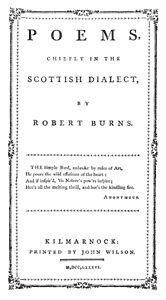CMSW - Robert Burns - Poems, chiefly in the Scottish dialect (original) (raw)
The text on these pages is the first edition of Robert Burns’ poetry, the Kilmarnock edition of Poems, chiefly in the Scottish dialect. From here you can view or download the image and text files. The Poems are part of the Corpus of Modern Scottish Writing and as such are searchable along with the rest of the corpus through integrated analysis tools.
Robert Burns
Robert Burns was born on 25 January 1759, in Alloway, Ayrshire. He is Scotland’s national poet, and his birthday is a national celebration, indeed Burns Suppers are held by Burns Clubs all over the world. 2009 was therefore the 250th anniversary of Burns’ birth, and also saw the celebration of Homecoming Scotland. Burns died in 1796, aged 37.
For more on Robert Burns, we suggest the following sources of information:
- Centre for Robert Burns Studies at the University of Glasgow
- The Global Burns Network, at the University of Glasgow
- Homecoming Scotland 2009
- Burns at the National Library of Scotland
- BBC 250 Years of Robert Burns pages
- BBC Writing Scotland, on Robert Burns
- National Burns Collection
- Robert Burns Country
The text
The first edition of Burns’ Poems, chiefly in the Scottish dialect was printed by John Wilson of Kilmarnock in July 1786, with a print-run of 612 copies. It sold out within a month. At this time, Burns, who was just 27, had been planning to emigrate to the West Indies, but following the success of the book, he stayed in Scotland and moved to Edinburgh.
The Corpus of Modern Scottish Writing project team has digitised the Kilmarnock edition of Poems, chiefly in the Scottish dialect from the copy available in Special Collections of Glasgow University Library. This process involved scanning the book, trimming and manipulating the pages, using optical character recognition to convert the images to text, and then editing and proofreading the resultant text. The final stage of editing and checking means that the text of the poems is more accurate than many other editions currently available on the internet. In particular, the ‘long S’ - ſ - which OCR software tends to interpret as an ‘f’, has been corrected.
